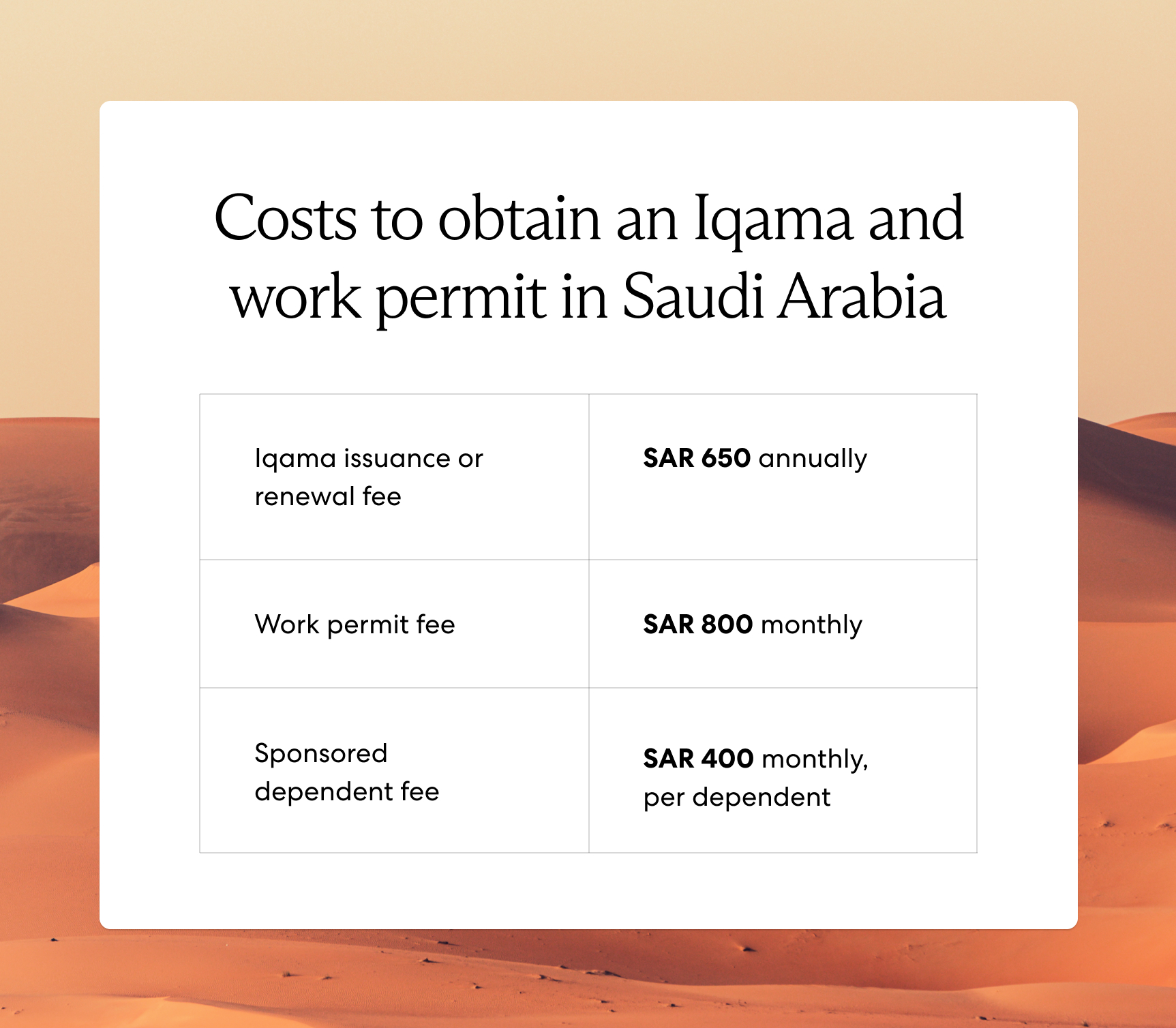Build a global team in minutes
Get expert helpWhen you think Saudi Arabia, you might picture sparkling skyscrapers, sandy expanses, and high-end tourism (and oil). What you might not know is that out of the 18.2 million employed individuals in the Kingdom of Saudi Arabia, 77% are foreign nationals.
When you learn that workers in the KSA benefit from tax-free income, affordable living, low crime rates, and a large English-speaking community, it becomes very clear why.
In this guide, learn about an iqama, the application process, costs, noncompliance risks to consider, and how to simplify hiring and relocating foreign talent in Saudi Arabia.
Meaning of iqama in Saudi Arabia
An iqama is a residence visa that allows foreign residents to live and work in Saudi Arabia. Foreign workers must have an iqama residence visa in Saudi Arabia and a work permit to comply with Saudi Arabia’s labor laws and immigration policies.
How to obtain an iqama visa
Before an expat can live and work in Saudi Arabia, they must receive visa sponsorship from a local employer, such as a Saudi company or foreign entity licensed to do business in the country. The employer goes through the following process to secure the necessary work permit and iqama for each foreign employee.
Here’s how to obtain an iqama visa in Saudi Arabia:
1. Apply for a block visa
The sponsoring company must first apply for a block visa approval from the Ministry of Human Resources and Social Development (MHRSD) through the Qiwa platform. Block visas are quotas that the MHRSM issues to permit entities to sponsor foreign employees for long-term work authorization. The MHRSD grants the block visa based on the applicant’s nationality and job role.
As of August 2025, all new work permits are classified under a mandatory skill-based system (high-skilled, skilled, or basic) based on the worker’s education, experience, salary, and age. “Employers are required to reclassify their current foreign workforce and update employee records via the Qiwa platform to ensure compliance,” says Legal Director Zahir Qayum at DLA Piper. “Failure to accurately classify workers may result in penalties that could impact future hiring of foreign staff,” he adds.
2. Obtain a visa authorization number + power of attorney
Upon block visa approval, the sponsoring company must obtain a visa authorization number and power of attorney through the Ministry of Foreign Affairs in the KSA. This step allows the sponsoring company to lodge a work permit application in their employee’s country of residence at the appropriate Saudi Diplomatic Mission.
3. Apply for a work permit
Once the sponsoring company obtains a visa authorization number and power of attorney, it must apply for a work permit on its employee’s behalf. The work permit application must be accompanied by the employee’s medical certificate issued by an approved medical center.
4. Enter Saudi Arabia to begin work
Upon approval of the work permit, the foreign employee can enter the KSA and start working.
5. Submit iqama and work permit application
Within 90 days of the employee’s arrival, the sponsoring employer must submit an application for a work permit and iqama to the MHRSD through the Muqeem platform or Absher portal. The employee must complete a medical examination in Saudi Arabia as part of the iqama issuance process. If the foreign employee needs to exit and re-enter Saudi Arabia at any time during validation of their work permit and iqama, the sponsor must submit an exit and re-entry permit to the Ministry of Interior.
Domestic workers: Special procedures and recent updates
Domestic workers in Saudi Arabia follow a separate application process through the Musaned platform, which is specifically designed for household employees such as housekeepers, drivers, and caregivers.
On November 12, 2025, Saudi Arabia’s MHRSD announced a six-month extension of the grace period for domestic workers with irregular legal status. This extension, running through May 2026, allows domestic workers who have absconded or whose residency permits have expired to regularize their situation without penalties through the Musaned platform. Employers and domestic workers can use this period to transfer sponsorship, renew documentation, or arrange legal departure from the Kingdom.
How long is an iqama visa valid?
A foreign employee’s work permit and iqama are typically valid for one year from the date of issuance. However, validity can range from one to five years, depending on the job type and iqama category. Also, it can be subsequently renewed annually or every two years.
How much does it cost to get an iqama visa?
The annual cost to issue or renew an iqama visa is 650 Saudi Arabian Riyals (SAR) for a one-year period, or SAR 1,300 for a two-year renewal. Under Saudi law, the employer is liable for all fees associated with a foreign employee’s work permit and iqama. The employer must also pay repatriation fees if the employee ceases employment.
Iqama tax in Saudi Arabia
In addition to the annual iqama cost, the employer must pay a monthly foreign worker levy, or Maktab Amal fee, for obtaining a work permit, which is SAR 800. These fees amount to SAR 9,600 annually (SAR 800 × 12 months) and can be paid in lump sums for 3, 6, 9, or 12 months. Note: Some industrial sector workers are exempt from this levy through December 31, 2025.
Foreign employees with dependent family members on their iqama must pay a dependent fee of SAR 400 per month per dependent. Saudi law does not indicate whether the sponsor or foreign employee must pay this fee, so it’s up to the employer to decide if they will cover the cost. Typically, the primary expatriate employee is responsible for paying dependent fees, though some employers choose to cover these costs as part of compensation packages.
Additionally, the sponsoring employer may have to pay a fine if their employee’s iqama is lost or expires before renewal. Penalties for late renewal or expired iqamas can result in fines and potential deportation.

Challenges of obtaining an iqama residence visa in Saudi Arabia
The iqama and work visa applications are complex
Obtaining an iqama visa and a work permit for a foreign employee is time-consuming and requires extensive documentation. Employers must file the application and submit all necessary paperwork, which can take months to complete.
The employer may also have to prove that no Saudi citizens are available to fill the position, as required by law. Saudi Arabia’s Saudization policy (Nitaqat program) mandates specific percentages of Saudi nationals in the workforce, varying by industry and company size. As of 2025, enhanced Saudization requirements have been implemented across 269 professions, including healthcare, engineering, and accounting sectors, with rates ranging from 30% to 70% depending on the sector.
Noncompliance has severe consequences
Employers and their foreign employees must comply with Saudi employment laws and immigration regulations. If a company employs foreign talent without the proper work permits and iqama visas, it may face severe fines ranging from SAR 10,000 to SAR 20,000 per unauthorized worker, and the KSA government may revoke its license to trade.
Additional penalties range from SAR 2,500 to SAR 10,000 for withholding employee passports or iqamas, and from SAR 2,000 to SAR 5,000 per employee for delayed salary payments. Foreign employees working without an iqama may also face heavy fines, arrest, and deportation. Expired iqamas can result in fines, employment disruption, and loss of access to government services.
Local sponsorship is standard but not always required
A non-Saudi national requires sponsorship from a local employer to secure the necessary work permit and iqama to work and stay in the country. However, local sponsorship requires entity establishment, which is costly and time-consuming for companies that don’t already have a legal presence in the country.
The Premium Residency program, introduced in 2019, allows foreign nationals to reside and work in Saudi Arabia without a local sponsor. This program offers permanent residency (for SAR 800,000) or renewable annual residency (for SAR 100,000), and allows sponsorship of family members.
Alternatively, employers interested in hiring talent in Saudi Arabia can simplify the process by partnering with an Employer of Record (EOR). An EOR acts as the legal entity and employer of your foreign talent, so you can take advantage of the benefits of global mobility while avoiding the arduous process of entity establishment.
An EOR also handles onboarding, payroll, visa administration, and compliance.
FAQ
How long does it take to get an iqama residence visa in Saudi Arabia?
A few weeks to several months if there are delays. The typical timeline is 2-4 weeks for straightforward applications, though complex cases or documentation issues can extend processing to several months.
Can foreign workers apply for an iqama without employer sponsorship?
In most cases, no—local sponsorship from a Saudi employer or authorized entity is required. However, the Premium Residency program offers an alternative path that allows foreign nationals to obtain permanent or renewable residency without employer sponsorship.
Who is responsible for paying iqama and work permit fees in Saudi Arabia?
The employer. Employers must also cover repatriation fees if the employee’s employment ends.
Can dependents be included under an employee’s iqama in Saudi Arabia?
Yes. However, foreign employees with dependent family members on their iqama must pay a dependent fee for each family member.
How can companies hire employees in Saudi Arabia without establishing a local entity?
By partnering with an employer of record. In this scenario, the EOR acts as the legal employer, handling visa sponsorship, onboarding, payroll, and compliance on the company’s behalf using its own established entity in the country.
Hire in Saudi Arabia without the red tape
Saudi Arabia offers a wealth of opportunities, but employers have to overcome several hurdles. Sure, you could set up a separate legal entity in the country and then track down an expert on visa law, an HR staff that knows competitive benefits and compensation for the region, and a dozen others.
Or you could partner with Pebl and let us handle it.
Our employer of record services in Saudi Arabia make hiring talent easy. We take care of onboarding, payroll, visa sponsorship, and pretty much everything else with our own legal entity already set up and ready to go.
Whether you’re ready to hire in Saudi Arabia or one of the 185+ countries worldwide that we operate in, let’s chat.
This information does not, and is not intended to, constitute legal or tax advice and is for general informational purposes only. The intent of this document is solely to provide general and preliminary information for private use. Do not rely on it as an alternative to legal, financial, taxation, or accountancy advice from an appropriately qualified professional. The content in this guide is provided “as is,” and no representations are made that the content is error-free.
© 2025 Pebl, LLC. All rights reserved.
Topic:
Immigration + Relocation


